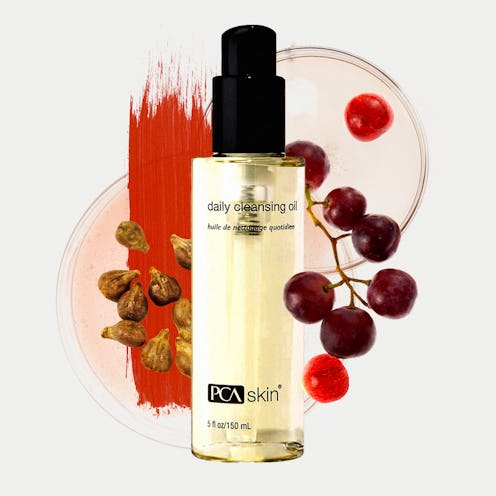(Back to Basics)
This Lightweight Antioxidant Oil Can Moisturize Without Clogging Pores
Meet grapeseed oil.

With new products, brands, and categories popping up every day, beauty can be a bit overwhelming. Back to Basics is our rudimentary beauty series that serves as your crash course on the science behind some of the best formulations in the game.
If you find yourself overwhelmed by the world of buzzy skin care oils, know that you’re not alone. With new “It” ingredients popping up every few months — from rosehip oil for its acne-healing properties to CBD oil getting incorporated into just about everything — it’s hard to keep up, let alone know exactly which oils will support your specific skin care needs.
Read more: Why Frankincense Oil Is Like “Liquid Gold” For Your Skin
The truth is, not all oils are created equal, and not all of them are universally beneficial for all skin types. However, there are a few lightweight and non-comedogenic options (read: won’t clog up your pores and cause breakouts) that boast plenty of benefits that the skin — whether dry or oily — craves. A seldom talked about option that you definitely shouldn’t sleep on (but, rather, should sleep with)? Grapeseed oil.
As the name suggests, grapeseed oil is, simply, the oil extracted from the seeds of grapes—typically those leftover from the winemaking process (very cool). Also known as Vitis vinifera, it’s lightweight by nature yet an effective moisturizer that packs in quite the punch in terms of benefits.
As a moisturizing ingredient, grapeseed oil is technically considered an emollient, meaning it forms a protective layer over the skin to trap in moisture. However, according to board-certified dermatologist Dr. Marisa Garshick, it’s been shown to have occlusive (which creates a barrier between your skin and the air) and humectant (which draws moisture to the top layer of the skin) properties, too. “Many oils, including grapeseed, serve to lock in existing moisture, but grapeseed can also hydrate,” she says.
But the benefits don’t stop there. “Grapeseed oil contains a high amount of fatty acids and vitamin E, which is why it’s used in a lot of moisturizers and facial creams,” says Dr. Shuting Hu, cosmetic chemist and founder of skin care brand Acaderma. “Naturally, it’s an antioxidant that will help reduce any signs of aging, sun spots, fine lines, or wrinkles. Its other benefits include anti-inflammation, increasing collagen production, reducing hyperpigmentation, evening out the skin tone and texture, and preventing free-radical damage.” In short, it’s a powerhouse jack of all trades — which is why you’ll find it formulated into all sorts of products, from body oils to facial serums and cleansers.
How To Use Grapeseed Oil
How you use grapeseed oil will depend on the type of product you’re using, as well as the other ingredients in its formulation. However, a once-per-day application is typically all you’ll need, at least when it comes to your face. David Petrillo, cosmetic chemist and founder of Perfect Image, is especially a fan of using it at night in serum-form, right before applying a moisturizer. “This will help retain hydration in your skin while you sleep, as well as improve its tone and texture,” he says. “Nonetheless, grapeseed oil can also be used in the daytime since it doesn’t increase your risk of skin damage as opposed to a retinol.”
It’s a highly versatile ingredient that Dr. Hu says can be effective both as a standalone ingredient in pure form or combined with other ingredients. She recommends using it in tandem with hydrating oils like avocado, coconut, and jojoba oil, while Dr. Garshick recommends formulas that pair it with other antioxidants to help boost its free radical-fighting prowess. Petrillo says that combining it with essential oils like lavender or frankincense can have a skin-softening effect, while tea tree oil, witch hazel, or rose water can up its acne-fighting benefits.
While it generally plays nice with most ingredients, Dr. Hu doesn’t recommend using it with salicylic and glycolic acids or any harsh detergents or cleansers, as this could potentially dry out the skin. Petrillo also advises against mixing it with lemon or orange essential oils, which may irritate the skin or cause a negative reaction.
Who Is A Good Candidate For Grapeseed Oil?
According to Dr. Hu, grapeseed oil can benefit any skin type since it’s rich in vitamin E and other antioxidants. “This will help strengthen the skin’s barrier and reduce the amount of water loss that can naturally happen within the skin,” she says. However, because it’s lightweight and non-comedogenic, it’s an especially great pick for those with oily or acne-prone skin who may not be able to indulge in other oils without spawning a nasty breakout. “For those who have acne-prone skin, it can help reduce any inflammation, redness, and irritation that you might be experiencing,” she adds.
Dr. Garshick also recommends grapeseed oil to anyone looking to minimize the appearance of signs of aging like fine lines, wrinkles, and dark spots. And because its antioxidant properties help defend against UV damage, it can be beneficial to anyone looking to prevent these signs of premature aging and photodamage, too — just don’t treat it as a replacement for your SPF.
Overall, because it has no known side effects, Dr. Hu recommends its use for all skin types and tones. “It’s a great natural skin care ingredient that offers a ton of incredible benefits to your skin,” she says.
Ahead, check out eight standout grapeseed oil products for the body and face that are great for introducing this versatile ingredient into your routine.
We only include products that have been independently selected by TZR's editorial team. However, we may receive a portion of sales if you purchase a product through a link in this article.
This article was originally published on